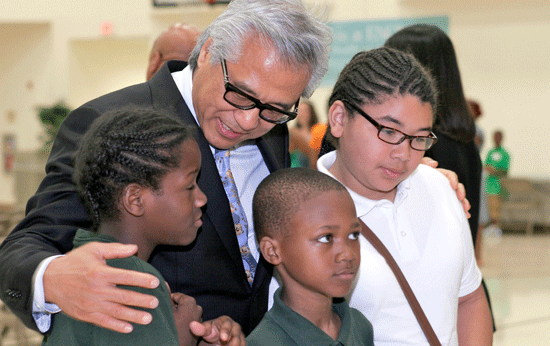EASTON, PA—Revered physicist Albert Einstein once said "If you are not making mistakes, you are not learning anything new." Recent discussions within the mathematics education community indicate that this particular theory of Einstein’s is catching on, as educators recognize more and more that making mistakes is an inherent part of the learning process.
Robert Sun, president and CEO of Suntex International Inc., has been saying this for years—nearly 24, to be exact. Sun, an inventor, engineer and entrepreneur, created the 24® series of math games in 1988, and introduced the First In Math® Online Program in 2002. “One of the key design elements of the First In Math program is that it allows students the freedom to make mistakes without being judged,” says Sun.

“Where can students go to learn from their mistakes in our math curricula?” asks Sun, pictured here congratulating students from the School District of Philadelphia. “First In Math offers the best way for today’s students to receive feedback in a non-judgmental, risk-free environment.”
“If we give students the freedom to make mistakes, they will push their skills right to the edge where the learning becomes active—where they start the myelination of their brain’s neural circuits, shift into Deep Practice and begin to excel,” explains Sun. “First In Math activities give students the immediate feedback they need to stay fully engaged and to actually learn from their mistakes. At their own pace.”
In many cases, students can be afraid to learn new skills or take on challenges because they fear failure. “Some degree of failure is essential to learning, and we have to do a better job of letting students know that this is normal,” says Sun. “I’m not talking about grades here, I’m talking about the freedom to get the wrong answer—sometimes more than once—on the FIM website, and then processing that feedback to figure out how to arrive at a correct answer. To me, failing is vastly different than being a failure. A failure is when you quit trying–that's when the learning stops.”
With an immediate-feedback resource like the First In Math program, Sun says students become engaged in and take ownership of their learning process, so they stop shying away from challenges and begin to actively seek them out. “Students will find a world of fascinating and rigorous mathematics challenges on the First In Math site,” says Sun. They will also find the freedom to make mistakes, and, he believes, to discover their full potential in the process.